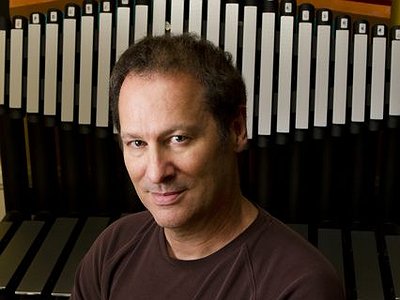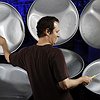When words and image fail
What, to you, are the main functions and goals of soundtracks and film music and how would you rate their importance for the movie as a whole?
The function of the score varies with each film. On the importance-scale, sometimes I feel like the star, sometimes like a character actor, sometimes I feel like I'm an extra in the crowd and sometimes I feel like I'm just sitting out in the parking lot waiting for the film to end. There are times when the composer is like a doctor and the film is the patient, don't tell any directors I said that. I look for the film's weaknesses …. maybe the music can make some of the performances more convincing. Maybe things are moving too slowly and the music can help pick up the pace. There are lots of problems you notice when you see a film during the editing process that can be improved with music. But the noblest function of music is to express the thing that can't be expressed in either words or images. That is when music becomes magic.
Jerry Goldsmith once asserted that, as a composer, one "can't be visual with the music". How do you see the relationship between image and sound in a movie? How directly are you working with the images in the writing process?
I work very closely with the picture most of the time. That is where a lot of my inspiration comes from. However, a film that is in the process of being edited can be a bit of a moving target so you can't get too anal about it.
Elliot Goldenthal mentioned that while a movie is "going linearly from side to side", one had to talk about film music "vertically". What's your take on this statement?
When I think of the vertical quality of music, I'm thinking about notes on top of one another on staff paper ... otherwise known as harmony. I'm not sure what Elliot is referring to here, but it probably is something less mundane than harmony.
Scores can either exist entirely of original material or temp-track music. Are these two approaches equal or do you feel as though a soundtrack written especially for a movie is always to be preferred?
I'm going to assume that by "temp track music" you mean fancy store-bought music. It doesn't take a lot of imagination to license a classic song like "In My Life" by the Beatles, throw it up against the image of a steaming pile of excrement and bring a tear to the everyone's eye. THAT'S CHEATING! … now that I've pissed off every music supervisor in the world, I have to admit that there are plenty of brilliant music choices in plenty of brilliant films that roll this way.
People tend to see film music as existing in a time of its own. Would you, on the other hand, say that there such a thing as zeitgeist in film music as well? Are there compositional devices which you don't find appropriate or wouldn't use right now, because they're too closely associated with a particular era?
Music is more related to fashion than it is to say … science. Rather than building on the past to develop ever more sophisticated forms, like the automobile for instance, music deliberately has to dumb itself down every quarter century just to keep up (or down) with it's audience, who only really wants something new.
Film music is one of those rare compartments within our fashion culture where age, wisdom and experience is often respected. Just look at the careers of Jerry Goldsmith and John Williams. But even film music gets time-stamped just like movies themselves and so yeah … I would never score a film with a Wurlitzer organ in the style of the silent era unless that was some kind of special effect I was going for.
The balance between visuals, fx and film music is a delicate one. What, from your point of view, determines whether or not it is a successful one?
It's hard to argue with success. If a film moves the viewer, odds are that all the elements are in balance.
In your opinion, should film music remain connected to the picture it was conceived for or should have it an intrinsic value outside of the movies?
I think it's worth about $9.99 if it's a decent score. Film music is mainly designed to support images and dialog and doesn't always hold up as a stand-alone experience. That goes for some of my music as well, but I like to put it out there anyway because there's always an audience for it.
Usually, it is considered that it is the job of the movie to win over an audience. But watching and listening are also active, rather than just passive processes. How do you see the role of the spectator in the cinematic communication process?
At the risk of sounding like a jaded senior citizen, I think our current culture of listening has been downgraded from what it was 30 years ago. Today, it's rare for someone to sit between a pair of speakers and give their undivided attention to music for an hour. More likely, music is the soundtrack to their lives. They listen to it while working out, driving, talking with their friends, doing the dishes, picking their nose … whatever. The most concentrated and focused audience a composer can have, is now in a movie theatre. That's what drew me to film music.
Please recommend two film music composers to our readers which you feel deserve their attention.
I like the big shots like Hans Zimmer and John Williams. I also keep my ears peeled for the young, new whippersnappers like Nathan Johnson and Mike Patton. I belatedly stumbled on to the music of Skrillex while working on Spring Breakers and I really admire what he's doing also.






